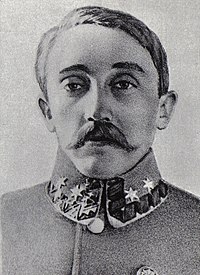Vaclav Kostek-Bernatsky ( Polish. Wacław Kóstek-Biernacki ; September 28, 1884 , Lublin , Russian Empire - May 25, 1957 , Warsaw , Poland ) - statesman of the interwar Polish Republic.
| Vaclav Kostek-Bernatsky | |||||||
|---|---|---|---|---|---|---|---|
| Wacław Kostek-Biernacki | |||||||
 Vaclav Kostek-Bernatsky in 1914 | |||||||
| |||||||
| Predecessor | Sigismund Bachkovich | ||||||
| Successor | Stefan Swidersky | ||||||
| |||||||
| Predecessor | Jan Kragelsky | ||||||
| Successor | position abolished | ||||||
| Birth | September 28, 1884 Lublin , Russian Empire | ||||||
| Death | May 25, 1957 (72 years) Warsaw , Poland | ||||||
| Father | Tomash Kostek-Bernatsky | ||||||
| Mother | Maria Nevinskaya | ||||||
| The consignment | Polish Socialist Party | ||||||
| Education | University of The Hague , Faculty of Philosophy | ||||||
| Activity | statesman, soldier, writer | ||||||
| Awards | |||||||
| Type of army | |||||||
| Rank | |||||||
| Battles | |||||||
Content
Biography
Young years
Since 1904, the leader of the Polish Socialist Party . In 1909 joined the French Foreign Legion . During the First World War, his regiment was at the front, Kostek-Bernatsky was wounded and captured in German, from where he fled to Krakow. In Poland, he joined the Polish military organization Pilsudski . He was a soldier of the First Brigade of the Polish Legions, where in 1918 he was promoted to officer. In parts established discipline on the model of the Foreign Legion, organized the military gendarmerie [1] .
Peacetime Activities
In peacetime, he was an officer in the Polish army and was constantly at Pilsudski, whom he idolized [1] . After the May 1926 coup , power passed into the hands of Pilsudski’s supporters.
In 1930, Kostek-Bernatsky was appointed commandant of the Brest Fortress , which served as a prison for political prisoners , opponents of Pilsudski, including former parliamentarians convicted during the Brest process . From July 1, 1931 - Governor of the Novogrudok Province . September 8, 1932 he was appointed to the post of the Polesye governor .
As the Polessky voevod, Kostek-Bernatsky became the organizer of the creation of a concentration camp with a special regime for political prisoners in Berez-Kartuzskaya [1] .
World War II
On September 3, 1939, Kostek-Bernatsky is appointed Chief Civil Commissioner with the rank of Minister . All civilian administrations in the territory of operational actions of the army submitted to him. Bernatsky-Kostka became the third person in the state after President Ignacy Moscitsky and Marshal Edward Rydz-Smigly [1] .
In September 1939, he was surrounded by Marshal Rydz-Smigly. Together with the entire headquarters he arrived at the Brest Fortress, which was to become the headquarters of the commander-in-chief. When on September 17, 1939, the Red Army invaded the borders of the Second Polish – Lithuanian Commonwealth , Kostek-Bernatsky was already on the border with Romania . On the same day, the army headquarters crossed the border.
Life in Romania
In Romania, the border-crossing Poles were interned and settled in the Craiova area without the right to leave. Throughout the war, Kostek-Bernatsky led a quiet life in Romania and did not participate in political activities [1] .
Arrest and Imprisonment
After the war, the new Polish government demanded that Romania extradite “criminals”, including Kostka-Bernatsky. He was subjected to cruel investigation for 8 years, as a result of which his health was ruined (rheumatism reached such an extent that he could not even hold a spoon). In March 1953, he was handed an indictment, under which he was accused of treason , collaboration with the Germans to the detriment of the Polish people, fascization of the country before 1939, mockery of political prisoners, support for Rydz-Smigly in negotiations with the Germans and other crimes .
After a short process, Kostka-Bernatsky was sentenced to death , but the death penalty was replaced with a life sentence . As a result of two amnesties , the term was reduced first to 15 years, and then to 7.5 years. Since by this time Costek-Bernatsky had already spent 11 years in prison, he was released.
Bernatsky-Kostka died in Warsaw in 1957 , having lived for 73 years.
Creativity
Vaclav Kostek-Bernatsky is the author of several books, including:
- "Jak oni!" ( 1909 ) - a collection of stories about revolutionaries, based on their own experience
- Na ulicach Warszawy ( 1911 ) - a collection of short stories about revolutionaries
- "Szlakami buntu" ( 1911 ) - the story of the revolutionaries
- “Straszny gość” ( 1931 ) - the most famous work, a collection of short stories
- "Ułan dyżurny" ( 1939 ) - memories
Literature
- Oremus F. Memoirs on Bernatsky-Kostka // Mistyrachnaya Brama. - № 21. - 2003.
- Cichoracki, Piotr. Droga ku anatemie: Wacław Kostek-Biernacki (1884-1957). - Warszawa: Instytut Pamięci Narodowej, 2009. - 495 s.
Notes
- ↑ 1 2 3 4 5 Oremus F. Memories of Bernatsky-Kostka.